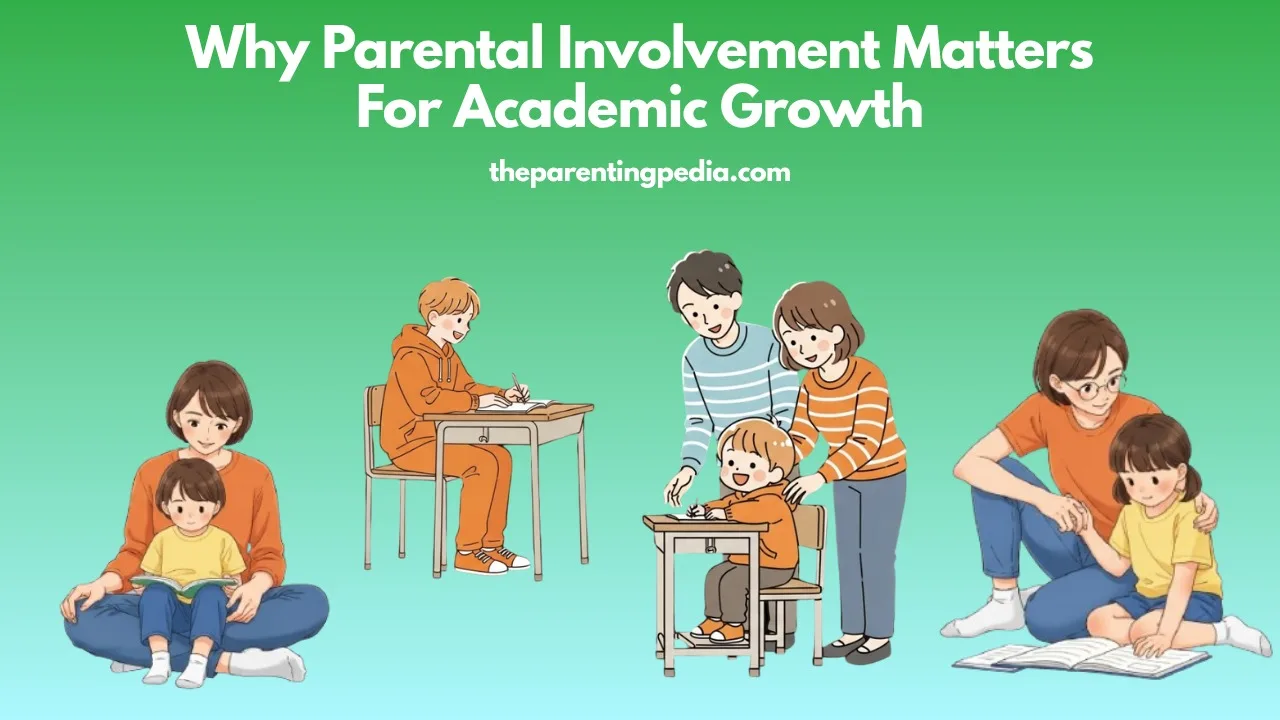Parental involvement is a key contributor to a child’s academic achievement. Many studies have consistently shown that children whose parents actively engage in their learning are more likely to excel in school, maintain a positive outlook on education and develop stronger social and behavioral skills. In an ever-changing educational world, the role of parents has become increasingly vital. This article talks about the impact of parental involvement on academic success, highlighting its benefits, common challenges and practical ways parents can support their child’s educational journey effectively.
The Importance Of Parental Involvement In Education
Parental involvement extends beyond attending parent-teacher meetings. It includes a broad range of activities, including helping with homework, creating a learning environment at home, maintaining communication with teachers, and promoting a love for learning in children. When parents are actively engaged, children receive the support and motivation needed to excel academically.
1. Enhancing Academic Performance
Research consistently highlights a strong correlation between parental involvement and student achievement. Children whose parents monitor their schoolwork, encourage good study habits, and participate in school-related activities tend to achieve higher grades and good test scores. The reinforcement of learning at home helps children grasp concepts more effectively and retain information longer in comparison to other children.
2. Developing Positive Attitudes Towards Learning
Parents who show interest in their child’s education instill a love for learning. Encouraging curiosity, praising efforts rather than just results, and emphasizing the importance of education contribute to a child’s intrinsic motivation. Such students are more likely to take responsibility for their learning and pursue knowledge beyond classroom requirements.
3. Building Stronger Communication and Social Skills
Parental involvement fosters open communication between parents, teachers, and children. This communication helps identify academic challenges early, allowing for timely intervention. Moreover, when parents engage with their child’s education, children develop better social skills, demonstrate higher self-esteem, and form stronger relationships with peers and teachers.
Ways Of Parental Involvement In Child Education
Parents can support their child’s education in multiple ways, both at home and in collaboration with schools:
1. Creating a Positive Learning Environment at Home
A home environment that values education enhances a child’s ability to focus and study effectively. Parents can ensure a dedicated study space for child, limit distractions and establish a daily study routine to reinforce good learning habits.
2. Encouraging Reading and Lifelong Learning
Reading to children from an early age promotes literacy skills and cognitive development in children. Even as children grow older, encouraging reading, discussing books, and exploring various subjects outside the curriculum nurtures intellectual curiosity and critical thinking in children.
3. Assisting with Homework and Assignments
While it is important parents must not do a child’s homework for them, providing guidance, clarifying doubts and ensuring assignments are completed on time instill discipline and a sense of responsibility. Parents can help children break tasks into manageable sections and encourage problem-solving skills in them.
4. Attending Parent-Teacher Meetings and School Events
Regular attendance at parent-teacher conferences, school activities, and meetings demonstrates an active interest in a child’s education. These interactions provide valuable insights into a child’s progress, strengths and areas that require improvement.
5. Communicating with Teachers
Maintaining open communication with teachers helps parents stay informed about their child’s academic progress. It also allows for discussions on any learning difficulties and the implementation of strategies to support the child’s learning experience.
6. Encouraging Extracurricular Activities
Academics are not the sole determinant of success. Encouraging participation in extracurricular activities such as sports, arts, and clubs helps develop well-rounded individuals with enhanced leadership, teamwork, and time management skills.

Challenges To Parental Involvement In Child Education
Despite the proven benefits, several challenges hinder parental involvement in a child’s education such as:
1. Lack of Time
Many parents juggle work and household responsibilities, making it difficult to dedicate sufficient time to their child’s academic activities. However, even small efforts such as discussing school events over dinner or reading together before bedtime can make a difference.
2. Limited Educational Background
Some parents may feel unqualified to assist with schoolwork due to their own educational limitations. However, they can still provide encouragement, monitor progress and seek external resources such as tutoring or online learning tools to support their child.
Also Read: How Digital Media Affects Children: Benefits and Drawbacks
3. Language and Cultural Barriers
Parents from diverse linguistic and cultural backgrounds may struggle to communicate with teachers or understand the curriculum. Schools can bridge this gap by offering multilingual resources, translation services and culturally inclusive engagement strategies that promotes open communication for parents who are from different cultural backgrounds.
4. Resistance from Children
As children grow older, they may resist parental involvement, perceiving it as interference. In such cases, parents should adopt a supportive and advisory role, encouraging independence while maintaining a presence in their academic journey.
Strategies For Strengthening Parental Involvement
To maximize parental engagement in children’s life, schools and communities must work together to create inclusive opportunities for parents.
1. Implementing School-Parent Partnerships
Schools should actively involve parents through workshops, volunteer programs and interactive learning sessions. Establishing a welcoming environment for parents promotes collaboration and enhances student outcomes.
2. Utilizing Technology for Communication
Digital platforms such as school portals, emails, and mobile apps facilitate seamless communication between parents and educators. Parents can stay updated on assignments, progress reports, and school events, making involvement more accessible.
3. Encouraging a Growth Mindset
Parents should emphasize effort and perseverance rather than just results. Encouraging children to view challenges as opportunities for growth promotes resilience and a positive attitude toward learning.
4. Setting Realistic Expectations
Parents must set achievable academic expectations that align with their child’s abilities. Pressuring children to excel beyond their capacity can lead to stress and burnout. Instead, recognizing and celebrating progress encourages confidence and self-motivation in children.

Conclusion
Parental involvement is fundamental keystone of academic achievement of children. When parents actively support and engage in their child’s education, they help promote essential skills like discipline, curiosity, and a solid foundation for lifelong learning. Even modest, consistent efforts can make a meaningful difference in a student’s educational path. To ensure children receive the motivation and support they need, schools and communities must continue to encourage and strengthen parental engagement.
FAQ
What is the role of parental involvement in students academic achievement?
Parental involvement plays a crucial role in a student’s academic achievement. Parents can help children grow by providing support, motivation and a proper learning environment. Engaged parents help improve study habits, reinforce learning, and promote a positive attitude toward education. Regular communication with teachers, assisting with homework, and encouraging reading enhance cognitive and social skills. This involvement boosts confidence, discipline, and overall academic performance in children, laying a strong foundation for lifelong success.
How parental involvement affects student success?
Parental involvement positively impacts student success by promoting motivation, discipline and a strong learning environment. Engaged parents support homework, communicate with teachers, and encourage curiosity, leading to better academic performance. This involvement enhances cognitive skills, boosts confidence, promotes social and emotional development, ultimately shaping a child’s long-term educational and personal achievements.
